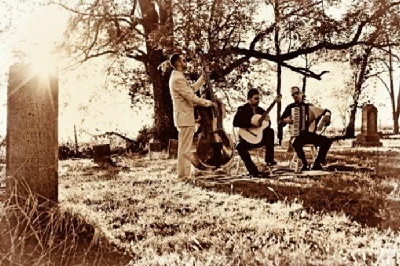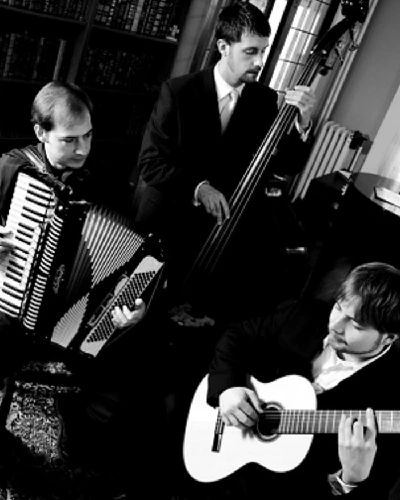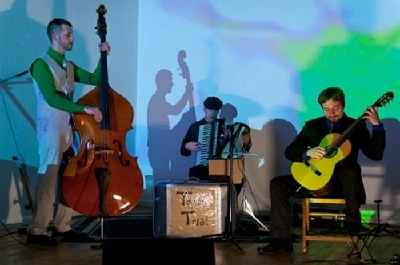published: 21 /
1 /
2011

Chicago-based acoustic trio Tonos Triad meld together classical, jazz and gypsy influences. They speak to Lisa Torem about how their unique sound has evolved
Article
They’re unplugged, yet electrifying; Aaron Ransdell, Rod Schindler and Yevgeny Baburin riff, pluck, strum and make intoxicating, intricate melodies as they meld together classical, jazz and gypsy influences. Strains of accordion, melodica and upright bass unexpectedly emerge, tempos quicken and emulsify and, by the end of the evening, their original compositions have won over a brand new audience.
Tonos Triad’s three-year ascent into the current, thriving urban folk renaissance has found them performing after the Indianapolis Symphony Orchestra Sibelius and Dvorak concerts. But the classically-trained trio is equally comfortable playing at folk fests, coffee houses and swanky lounges.
These three dress like the Blues Brothers and banter like the Marx Brothers, yet compose like unabashed, celestial angels. They speak to Lisa Torem about how their unique sound has evolved and how they plan to spread the word.
PB: Tonos Triad has been playing everything from coffee houses, block parties and fringe festivals for the last three years around the Indianapolis area. You’re looking, however, to “branch out.” Where will you go from here?
RS: We'd like to branch out in an online presence as well as a bigger regional area. House concerts seem to be a great way these days for acoustic acts to tour and reach new fans. A European tour would be nice too someday!
YB: I feel that we’ve tapped the Indianapolis market. The next step is to start hitting different cities in the Midwest and growing the exposure we enjoy in Indianapolis to a Midwest level.
AR: Well, we've already played a few other cities in our region like Louisville, Kentucky and Nashville, Tennessee. We're going to have to start from scratch and build it up just like we did here in Indy. I think our next target is Cincinati, Ohio. Building a strong regional fanbase and finding our own circuit is what we need to do. We don't fit into a ready-made niche so we just have to carve one out for ourselves.
PB: Many of the melodies the band has composed are drawn from scales that are not ordinarily associated with Western pop music.
RS: Yes that is a true statement. We like to experiment with tones, scales, and different modes.
YB: I think this is necessary for the type of music we create. Rock music can get away with e minor blues a lot easier than us and we have to stay creative to keep people interested.
AR: That is a statement, not a question.
PB: You list John Zorn and Tom Waits as influences. I believe Waits had a passion for Bulgarian folk music. Has the Tonos Triad shared that passion?
What specifically did the band appreciate about John Zorn?
RS: Not so much a passion for Bulgarian music specifically, but there is a noticeable eastern European flair to our sound at times. I like Zorn for his creativity and prolific output, as well as the ability to compose and shift in and out of musical genres with such ease and adeptness.
YB: My classical guitar experience is focused more around Latin American and old European styles. All of the band members enjoy a wide variety of music that encompasses many regions.
AR: We share a general interest in gypsy and eastern European folk music. The harmonic minor scale combined with odd-meter rhythms just gets me. Zorn is an influence because of his melodies. A strong melody is key for an instrumental band. You can have all the rhythm and groove in the world, but if there's not a memorable melody the song won't stick with you.
PB: Let’s talk about your YouTube video, 'Murder Swing'. These card sharks puff cigarettes and engage in a high-stakes game; events turn sinister. What came first, the idea for the video or the song?
RS: The chicken came first.
YB: The song was written well before shooting the video. The idea for the video was, however. inspired by the fact that we had someone who was willing to direct, shoot and edit. Props to Brandon Spitz.
AR: The song came first. The video idea came together based off of our resources and limitations. It worked out well and it's still our favourite video. Brandon Spitz did an excellent job of shooting and editing to make our storyboard come into fruition.
PB: In regards to your debut and self-titled 'Tonos Triad' – within the first three pieces - the listener is introduced to ‘Abacadabacus’ which may be described as “smooth jazz”, then ‘Solewhole’ with handclaps and ‘Fisherman’s Sweater’ which is plaintive and governed by an accordion. Further along are some bolero swing and Brazilian rhythms. Did the band pinpoint styles to concentrate on initially?
RS: No, I don't think so. We all listen to so many different styles of music that it all comes back into the band sometimes on a subconscious level.
YB: We never sit down and say, “Let's do something that invokes a waltz or an ethnic rhythm style.” Everyone contributes to the writing process and the songs develop naturally. In the end the music speaks for itself and we’re just the three lucky guys who get to perform it.
AR: We didn't. All the different styles on the self-titled album came from our own interests and restlesness. Maybe a little boredom.
PB: In the tune, ‘Devil’s Pinwheel’ there seems to be some personification. Which instrument is “the devil?”
RS: The creepiness of the melody along with the circular pulse of the rhythm.
YB: When that song was composed, it needed a name. Rod suggested pinwheel because of the of spinning rhythmic quality. I always thought more about the different characteristics of a pinwheel owned by the devil when performing that song.
AR: I don't really see it that way. To me, ‘Devil's Pinwheel’ is named for the rotating time signature that gives it an uneasy feeling.
PB: ‘Typewriters and Tarantulas’ was just released in November of 2010. I’m hearing some funk in ‘Skunk Paste’ and ‘FWBT.’ ‘Rocket Lawnchair’ has a bass solo.
What are the influences here?
RS: ‘Skunk paste’ = funk, ‘Fwbt’ = funk rock and rockabilly, ‘Rocket Lawnchair’ represents our heavy metal pasts.
YB: I came up with the name ‘Rocket Lawnchair’ before the song was written, so the inspiration for that song was mostly the title. I always think about Rick James when we play ‘Skunk Paste’, and ‘FWBT’ hops around from rock, funk and rockabilly.
AR: If you're a bass player and you don't like funk......you're not a real bass player. I like to show off sometimes and these songs help me do that.
‘Skunk Paste’, ‘FWBT’ engage the audience in a different way. They're less cerebral and more dance oriented.They help break the monotony and have more of a party vibe. The bass solo in ‘Rocket Lawnchair’ is thought of more as a breakdown and was inspired by the band Tool, who are also an influence, due to their brilliant syncopation.
PB: What about ‘Tiger and Dragon’? Which instruments helped create that Asian
sound?
RS: ‘Tiger and Dragon’ is all guitar. Almost imagine a koto. The glockenspiel is just a sub melody
YB: Rod wrote that song and his melodic approach is what makes it sound Asian.I find this interesting because we don’t deviate much from e minor on that tune, and the beginning melody is almost all e pentatonic.
AR: Rod's wife.
PB: Yev, your bandmates had already met while working at the Indianapolis Museum of Art, before you came along. Was it difficult to merge musical ideas with the others after being last on board?
RS: Those fuckers are terrible to work with.
YS: At first, it was difficulty. I was playing in a heavy metal band in high school, but switched exclusively to classical guitar through college.
I had never improvised on the level the other guys expected me too and had completely forgotten how to learn music without sheet music staring back at me. I feel like I did a good job catching up, although I don’t always feel the rest of the band always feels that way.
PB: Image-wise, I’m wondering if both album covers convey a lot about the trio. First off, there is the earth-toned selection of acoustic instruments strewn on the floor next to an empty suitcase on 'Tonos Triad' and on 'Typewriters and Tarantulas' there is an illustration of an ages-old typewriter and, of course, that spindly freak of nature. What’s the hidden message?
RS: The hidden message is that we have some kick ass artist friends.
YB: The first album was self titled, so the theme was the band. The second album needed a theme and the artist who painted the cover, Indy local William Lawson, collects both typewriters and tarantulas in his loft in Indianapolis. So I guess the hidden message is a tribute to William.
AR: There's no hidden message. Both album covers were done by local artists and friends of ours. We gave them vague guidelines and let them create. Both album covers are linked more to the artists who painted them than the band. That's fine with me.
PB: American audiences are often used to thinking that instrumental music is
supposed to be “background music.” We’ve been brainwashed by conglomerates
that make sure we hear it constantly on elevators and at shopping malls.
Does this phenomenon influence the kind of audience you attract? Does playing
without a lead singer guarantee that you will attract an esoteric crowd?
RS: Our music can serve as foreground as well as background music. We've played shows where the audience is sitting on the edge of their chairs listening to every note. We've also played gigs where we're more like "musical wallpaper".
Our crowd tends to be all ages and many different tastes. We flit from genre to genre and become different things to different people. It is an interesting phenomenon. Not having a singer is a challenge sometimes, but, however, our unusual styling, I believe, has brought us more success and attention than what a traditional lineup would bring.
YB: I haven’t found the audience we attract to be esoteric. We’ve definitely felt comfortable in front of a wide variety of people. I think the background music factors more into the type of gig it is. We’ve been hired for wedding and parties where people were expecting us to be a cocktail band, and we fit well into that role. But the music has proven engaging enough in places where people expecting to listen to music.
AR: Sometimes Tonos Triad has been hired to be "background music". Those aren't our favorite gigs but there are usually a few people that pay attention and get it. We realize that our music isn't for everyone and that doesn't bother us.
PB: Tonos Triad incorporates a number of instruments including the melodica,
mandolin and glockenspiel. How do you determine which instrument to use when
composing?
RS: Sometimes the melody is written with a specific instrument. Other times we experiment until we get the right fit. Sometimes a certain instrument is automatically disqualified (for some unknown reason)
YB: We all bring ideas to the table, and sometimes Rod will write something specifically for one of his instruments, or sometimes choose what goes best with someone else’s idea.
AR: It depends on what we need for the tune. More rhythm? More melody? More underlying chords? Sometimes when composing we'll have Rod try a few different instruments or sometimes it's obvious for us what to use.
PB: How does the band work out songwriting ideas and arrangements?
RS: There are times when a member has a song through composed from beginning to end and writes our parts for other members. Sometimes someone has a riff or sketch and we work it out as a band.
Writing however is a democratic procedure in this band. We all feel like we must be satisfied with the way the song sounds as a band. There are times when we must compromise and reach middle ground. Each one of us significantly composes for the band.
YB: We all bring ideas to the table, and sometimes it is developed, and other times it’s a melody or some chords strung together. There’s usually lots of discussion and we try to focus on melody and keeping the songs interesting and moving.
AR: We work out our songwriting and arrangements with a lot of tolerance and patience for each other (Laughs).
PB: So many of your compositions sound cinematic. Do you plan to explore film, more fully, as a medium to move your music further along?
RS: I hear this comment a lot. However at the moment it seems like a difficult arena to enter. I would be really excited to break into this field.
YB: Yes, we wish we knew how to break into that sort of thing.
AR: You're right. We agree. We've tried to submit our tunes for film but that's a tough market to crack.
PB: The band has used a suitcase as a stand-in for a drum. You guys wear suits and ties to performances. Are you great inventors or CIA agents? What else can you tell us about the mysteries of the Tonos Triad, present, past and future?
RS: If we tell you too much, we'll have to kill you!
YB: The suits are partially because of my experience as a classical guitar player, and because Aaron thought it was a neat idea. There aren’t really too many mysteries. We’re just average guys with a passion for music.
AR: We're all really just "jeans & t-shirt" guys who realize we need to present ourselves when performing. Being a good musician isn't enough. Having an image is still an important part of being a band whether other artists want to admit it or not.
Also, wearing a suit prevents me from doing anything really stupid. I feel like I have to act like I dress and plus, I wouldn't want to ruin my suit.
PB: Thank you.
Picture Gallery:-

